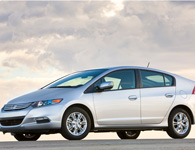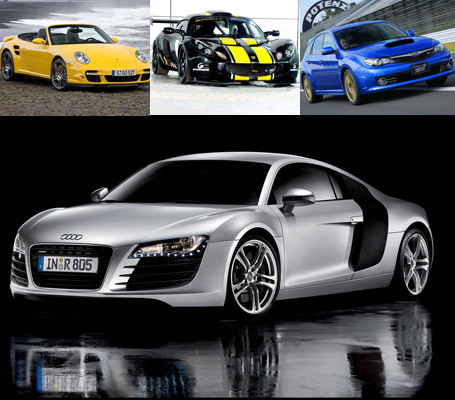While the economy has been heading south, the motor industry has been hit particularly hard. No where else is it more dramatic for the big three (GM, Ford and Chrysler) in America. Cash strapped and lobbying politicians for financial aid to merely preserve a century old industry that supports a million jobs across the big Wild West.

In Asia, Toyota announced its first loss - about US$1 billion - since 1941. Not to worry as the Japanese global leader has the healthiest cash reserve among automakers. And dare I predict that the Japanese giant will retaliate with a wave of innovative and imaginative dazzling new models that has been missing from Toyota since 1999's Yaris/Echo/Vitz. With the appointment of Aiko Toyoda, the 52-year-old grandson of the founder, the beige-ish Toyota cars could improve significantly. Other Japanese companies like Honda has withdrawn from F1 and Subaru has announced its departure from World Rallying Championships. Participation in such big expenditures sporting events used to be huge publicity stunts for manufacturers. In such times, a reactive decision to curb spendings could be imperative to save jobs. Speaking of Honda, the new Insight could be the most significant car to be on sale in 2009. Finally an affordable and sensible hybrid car.
Sadly, Korean SUV specialist, Ssangyong has become the first victim of the econ-flu. The cash-strapped Ssangyong has idled its plants and not paid its staff any wages for the last month. Parent company, Shanghai Automotive's refusal to inject emergency funds could be the final nail in the coffin for Ssangyong.
Europe is not spared from the on-slaughter despite the Russian auto boom. Swedish car makers who have struggled for eons to join the elite premium car makers are now facing elimination; Ford has put Volvo up for sale, as they have been bleeding since 2007, with no imminent sign of breaking through the crucial 500,000 units a year barrier. In an even more fragile position, Saab will be dumped by GM as it has never once posted profits. A pity for the company with the "IT" car image in the 80s. Operating with a two model range is quite unimaginable in today's brutal premium car market.
Not even fresh models are helping Renault, as the French manufacturer has registered a shocking 25% dip in new car registrations in UK. Lucky for Renault, its alliance partner, Nissan is still performing well. Nissan has actually gained sales volume in the shrinking US market and also its luxury arm Infiniti is making successful debuts in new "money" markets like Russia and Dubai.
While the style driven French manufacturers have secured an agreement from the French government for financial aid as they continue to hunt for their missing mojo, the surprising continual rise of the Italian car makers has been deeply impressive. Ferrari has been quoted that it has sold 6,500 cars in 2008, the same record high as the previous year.
Also unexpectedly, Subaru having spent most of 2007 and 2008 conforming to mainstream mass car designs has seen its efforts paying off handsomely. It posted a rise in the number of cars sold, particularly in the United States with the SUV, Forester leading the Fuji-based company's charge. Trading in some quirkiness for gains in sales seems to be a wise move to secure the future of the small volume car maker.
Another car maker also renowned for its four-wheel drive system has also posted serious gains in market share, Audi. Relying on a youthful, well-reviewed model line-up, Audi is well on its way to meet this year's target of 1 million new car sales for 2008.
2008 has also been a lesson for other auto industry folks. One does not need to sell more cars to make more money. Witness how Porsche has managed to post a pre-tax profit of US$12 billion in this financial year, a massive 46% leap from the previous. Bearing in mind that actual sales of Porsche has practically nose-dived in major markets like the United States and Britain. Two words: Wendelin Wiedeking. Business students should start building worshiping shrinks of this shrewd Porsche CEO. In the process of buying over Volkswagen, Porsche has made a killing from trading shares. Even more incredible is niche sports car maker, Lotus's US$2.9 million profit, which excludes expenses on R&D. This is largely due to its technology consultancy business.
With prices of oil lumbering towards prices of less then US$40 per barrel, we hope for a firm recovery of the economy as soon as 2009. In short, 2008 and probably the early part of 2009 will be tough on the motor industry. Over-capacity, low efficiency and poor products could be a thing of the past by 2009 as we experience a major industry shuffle and tussle.












 打印版本
打印版本











读者回应
请先登入再使用此功能。